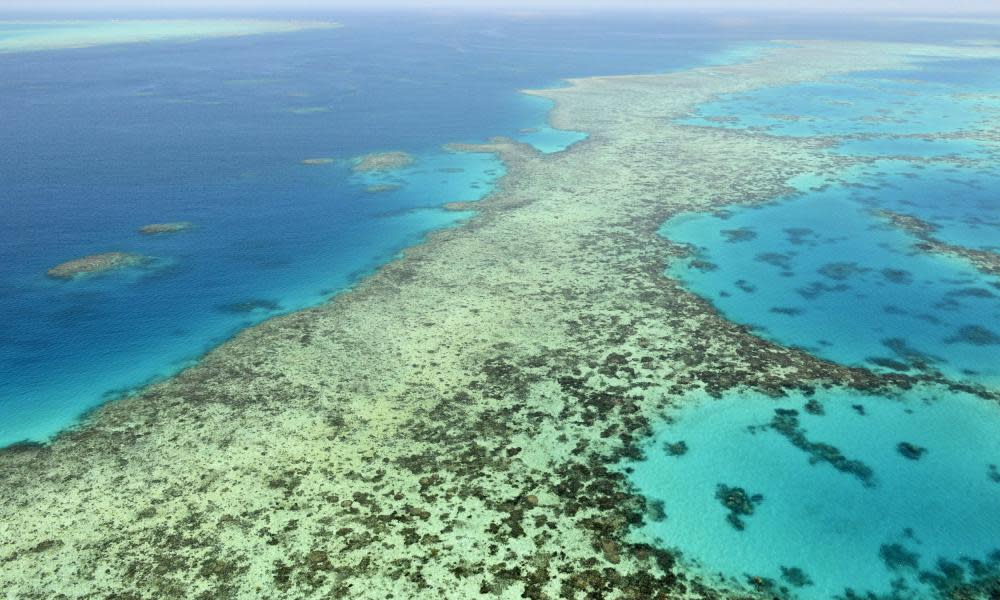Queensland minister says UN warning on Great Barrier Reef status shows Morrison must act

Queensland’s environment minister says UN officials recommending the Great Barrier Reef be placed on the world heritage “in danger” list shows the Morrison government must do more to deal with the climate crisis.
Meaghan Scanlon’s comments put the state government at odds with the federal environment minister, Sussan Ley, who has accused the United Nations Educational, Scientific and Cultural Organization (Unesco) of a “complete subversion of normal process”.
Ley on Tuesday said the UN body assured her department a week ago it would not suggest an “in danger” listing. The Australian government has vowed to fight the recommendation, which will be considered by the 21-member world heritage committee next month.
Queensland’s environment minister said she did not want the reef placed on the “in danger” list but the recommendation clearly “shows that more needs to be done and the world is watching”.

“Anyone looking at Australia’s position can fairly see the commonwealth needs to take more action in the climate space, either on a net zero target or investing in creating more renewable energy opportunities,” Scanlon told Guardian Australia.
Asked if she thought the Unesco recommendation was unfair, she said: “I can see why the advisory committee expects our country to do more.”
Related: Great Barrier Reef should be listed as ‘in danger’, Unesco recommends
Global heating caused by fossil fuel burning has driven ocean temperatures higher, leading to three mass bleaching events on the reef since the last time it was assessed by the committee in 2015.
The federal government has previously conceded the values that were recognised in the 1981 world heritage listing were being compromised by global heating but the coalition suspects China may have played a role in the latest recommendation.
China chairs the World Heritage Committee and will host the meeting on 16 July at which the recommendation will be considered.
Scanlon was not asked to join a meeting late on Monday between Ley, the foreign minister, Marise Payne, and the Unesco director-general, Audrey Azoulay. Ley said on Tuesday she had “expressed Australia’s dissatisfaction with the process” and the government would “contest this flawed approach.”
The commonwealth and Queensland governments are jointly the “state party” responsible for the reef. The 2,300km site has been on the world heritage list since 1981.
Scanlon said the state would work “constructively” on the issue but the commonwealth was responsible for representing the state party and she would “not get involved in geopolitical discussions”.
Related: Snow-white coral of once-vibrant Great Barrier Reef a sign urgent action must be taken | Adam Morton
“Our number one priority is protecting this world heritage-listed icon, but we need national leadership,” she said. “This report shows more does need to be done and as a first step the commonwealth has to come out and set a net zero target, like Queensland and other states have, as well as peak farming bodies and the minerals council.”
Scanlon said the Nationals replacing Michael McCormack with Barnaby Joyce as their leader would not help the government take bolder steps on climate policy.
“I don’t think it helps, having the second most influential person in the government with a history of opposing sensible action on climate change and the jobs that action provides. The rest of the country is moving in this direction and yet the Nats keep dragging their feet.”
In its recommendations made public overnight, Unesco said a current review of the Reef 2050 plan – a joint policy between the state and federal governments – needed to “fully incorporate” conclusions from a major government review that “accelerated action at all possible levels is required to address the threat from climate change”.
Ley said on Tuesday climate change was the biggest threat to the reef but the world heritage committee was “not the forum” to “make a point” about climate change.
“This decision was flawed and clearly there was politics behind it … for the World Heritage Committee not to foreshadow this listing is appalling,” she said.
She said there were more than 80 world heritage properties that Unesco had identified as under threat from climate change. She suggested the government may have understood if the body decided to list all of them as “in danger”, but it had singled out the reef.
It is the second time the reef has faced the threat of an “in danger” listing. The last time, in 2015, the government embarked on a successful lobbying effort to pressure the 21-country committee.
Unesco is also recommending that a monitoring mission be launched to develop “corrective measures”. It has asked the Queensland and federal governments to submit a report by February 2022 outlining new steps to protect the reef.
The conservation groups WWF-Australia and the Australian Marine Conservation Society lobbied members of the committee before the reef decision asking them to pressure Australia to take stronger action on cutting greenhouse gas emissions.

 Yahoo Movies
Yahoo Movies 
